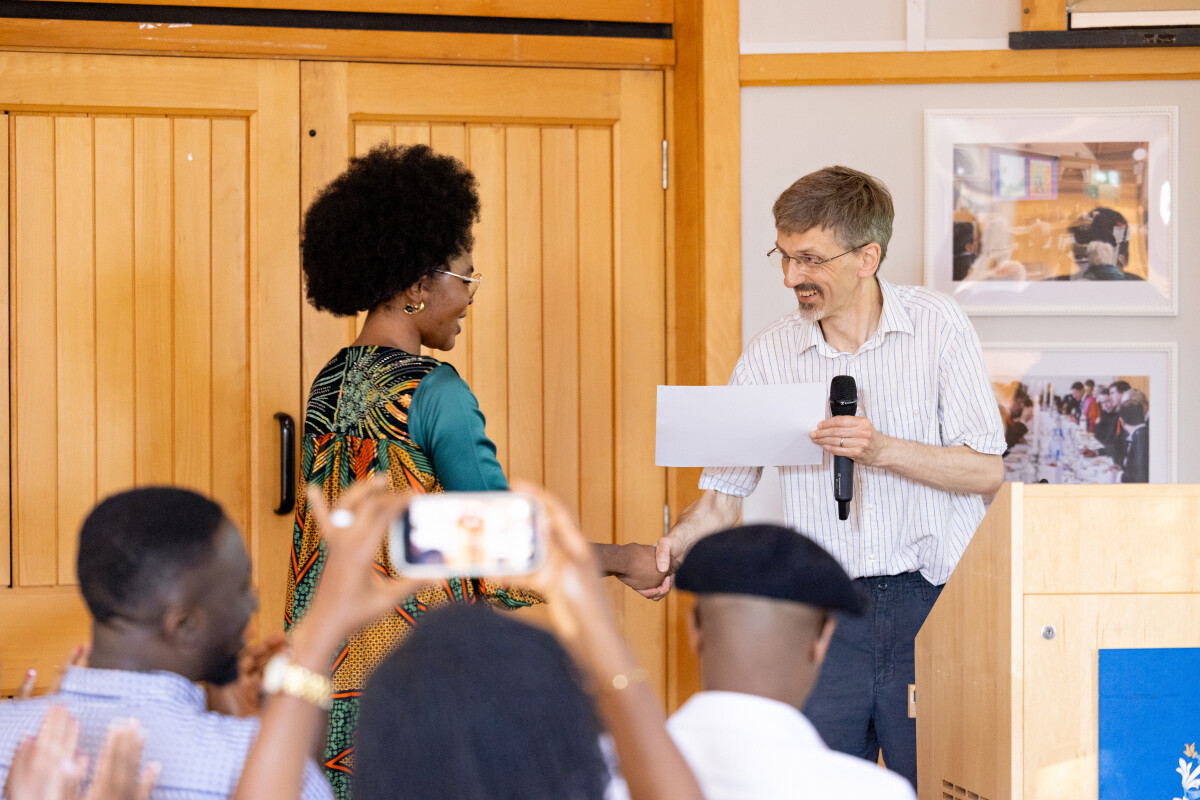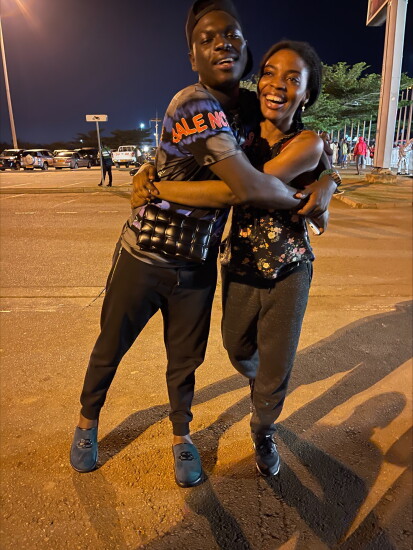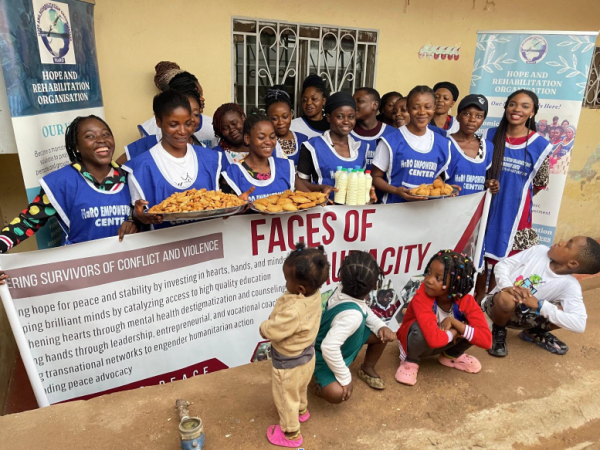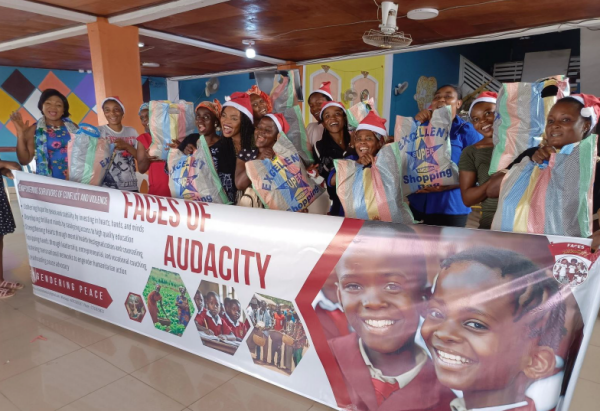The Anglophone Conflict in Cameroon - My Journey from Personal Experience to Academia

By Abii-Tah Bih, winner of the 2025 Dr Amit Bhasin Prize
In November 2016, Anglophone Cameroonian lawyers and teachers staged peaceful protests against the socio-economic and political marginalization of English-speaking Cameroonians by the Francophone-dominated government. The state’s violent crackdown on these demonstrations catalyzed what has become a protracted intrastate conflict. Today, the armed struggle between separatist fighters and the military in Cameroon’s North-West and South-West regions has claimed over 6,000 lives, displaced more than a million people, and left 2.2 million, nearly half the region’s population, in urgent need of humanitarian aid.
When the conflict erupted, I had just graduated from high school and was preparing to begin my undergraduate studies in the United States. My younger brother, then only 12, was in a boarding school at the heart of the conflict zone. One searing afternoon, separatist fighters stormed his school, tore down the gates, and threatened to conscript students. Administrators pleaded for time so the students were given hours to evacuate and the school was ordered to shut down in observance of “ghost towns.”
From eight hours away, my family watched in anguish as violence engulfed our hometown. We clutched our prayer beads, helpless as smoke defined the skies and the death toll rose. The wait for our relatives to smuggle my brother out of the town and into safety was excruciating. When we finally could hold him again, he was physically worn but emotionally unaware of the trauma he had narrowly escaped. Looking back, my baby brother was the first forcibly displaced person I ever came to know, not through statistics, but through lived experience. Almost immediately, my instinct to shield my brother from any further precarities morphed into an interest in the causes of refugees and Internally Displaced Persons more widely.

Abii-Tah reunited with her brother
For months after the conflict erupted, my brother spent months out of school, slowly coming to terms with the psycho-social and academic tolls of his displacement. I, on the other hand, became part of the Cameroonian diaspora in the U.S as an undergraduate student at Michigan State University (MSU). As I juggled multiple jobs while in school to sponsor his relocation to the U.S. to continue his education in safety, I realized that my efforts were part of a broader pattern: Cameroonians abroad were mobilizing to support displaced communities through advocacy, remittances, and humanitarian initiatives. While some diaspora actors exacerbated tensions, many others played vital roles in sustaining lives and rebuilding hope.
I also witnessed displaced persons themselves leading critical interventions like rehabilitating former fighters, launching informal aid networks, and fostering community resilience. Despite facing intersecting vulnerabilities, minimal state support, and waning international attention, they were shaping the humanitarian and political contours of the conflict. This dual dynamic of diaspora engagement and displaced persons’ agency sparked my intellectual curiosity and led to my PhD research interests.
Grounded in 200 interviews and ethnographic fieldwork across Cameroon, Nigeria, the U.S., and the U.K., my research explores how displaced populations and diaspora actors negotiate agency and vulnerability to the transnational politics of conflicts. It aims to inform policies and paradigms that foreground the ingenuity of these migrant groups in enhancing humanitarianism, peacebuilding, and post-conflict reconstruction. My work has earned me invitations to present at esteemed academic associations, including the International Studies Association, the International Political Science Association, and the African Studies Association of Africa.

Faces of Audacity supporting Internally Displaced Persons
Driven by a commitment to service, I founded Faces of Audacity (FOA) to operationalize my research by partnering with IDP and refugee-led institutions to proffer solutions to migration challenges in Africa. In the last year, FOA has executed a four-pronged strategy to support 145 IDPs and refugees in Cameroon and Nigeria. This included organizing (1) a privately funded Christmas celebration for 50 IDP orphans and their 20 guardians, (2) a two-week seminar for 10 displaced single mothers, including grants for small businesses, counseling, and vocational training, funded partly by a $1,000 grant from the Cameroon Humanitarian Relief Initiative, (3) financial support and nutritional staples for 35 refugees in settlements in Ogoja, Nigeria, (4) a back-to-school campaign providing scholarships and supplies for 30 displaced children and teenagers, financed entirely through grassroots fundraising.

Faces of Audacity Christmas Party for Internally Displaced Orphans
Back in Cambridge, I remained engaged by co-chairing the Center of African Studies’ 2023 seminar series on the International Politics of Armed Groups in Africa and coordinated the Center of Governance and Human Rights’ 2022/2023 practitioner series. I also co-led the Pre-application Mentorship Project (PAM), sponsored by the Mastercard Foundation, which trained over 600 African students to craft competitive postgraduate applications. Our toolkit has been viewed over 10,000 times, and one in five incoming scholars credited PAM’s mentorship. Also, as co-chair of the Cambridge Africa Mentorship Program (CAMP), I matched 147 aspiring postgraduate mentees with 84 mentors at Cambridge to facilitate application processes. We also organized mock interviews, and I moderated a scholarship webinar in partnership with our Oxford mentorship counterparts that drew over 2,800 participants. These efforts have led to over 30 mentees gaining admission to institutions like Cambridge, Oxford, Yale, and Edinburgh, with ten securing full-ride MPhil and PhD scholarships.
My academic journey, rooted in intellectual rigor and service, has been supported by awards including approximately $500,000 in scholarships since High School. These include awards from the African Leadership Academy in South Africa, the Mastercard Foundation scholarship at MSU for undergrad, and Cambridge’s Trinity College and Africa Changemakers Scholarships for my MPhil and PhD. In 2021, I also received MSU’s Richard Lee Featherstone Endowed Prize as the most outstanding graduating student, alongside dual awards for the best International Relations and Comparative Cultures and Politics student. These accolades were for intellectual ingenuity, including maintaining a near-perfect GPA but also for service interventions like leading 50,000 students as MSU’s student government president and co-fundraising $85,000 to distribute grocery gift cards to over 1000 furloughed and food-insecure students during the Covid-19 pandemic.
At Cambridge, my visual representations of refugees' camaraderie amidst dwindling socio-economic support won second prize in the Department of Politics and International Studies' 2024 fieldwork photography contest. For our mentorship work, my CAMP co-chair and I also received the Cambridge Student Union Award for Contributions to Access and Widening Participation. However, receiving the Amit Bhasin Prize has been deeply meaningful. Being initially nominated by my exceptional PhD supervisor, Professor Sharath Srinivasan, and my brilliant friend and former recipient, Inioluwa Afolabi, was the honor of my life. Also, that the committee endorsed my plan to use the prize money to fund FOA’s back-to-school campaign this year is a powerful affirmation. In a conflict too often met with silence, this recognition and commentary speaks volumes.

